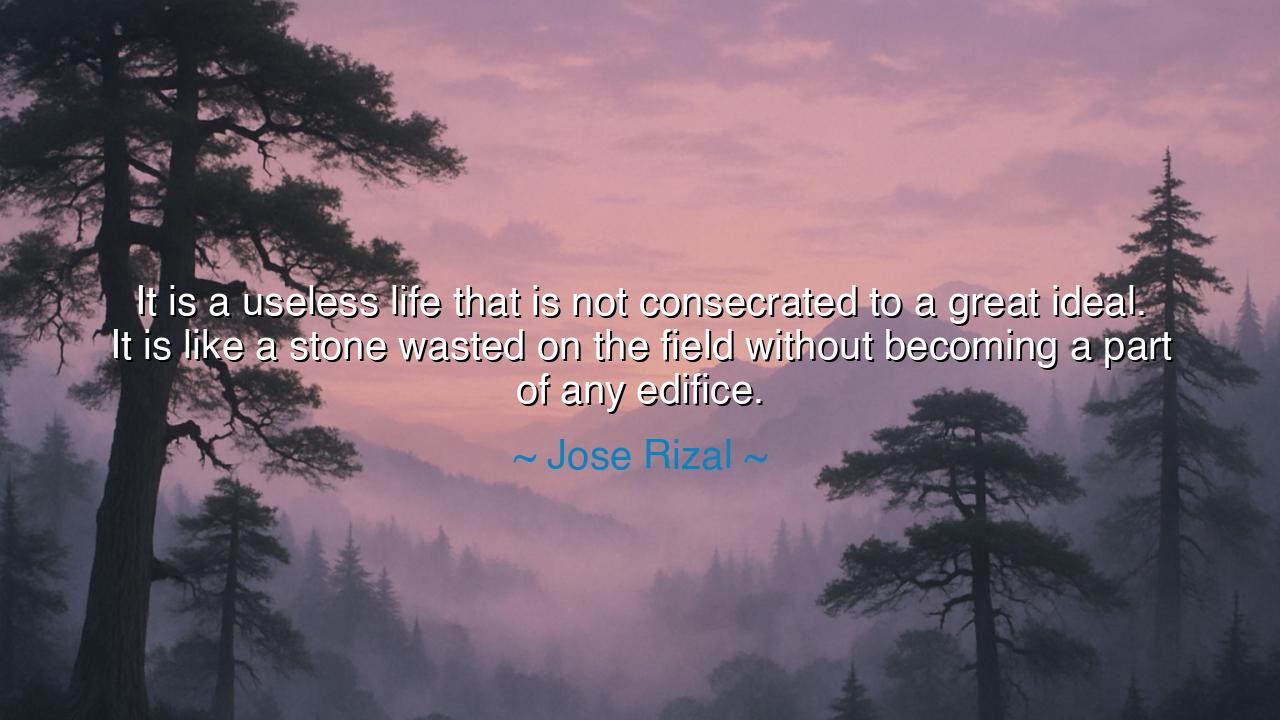
It is a useless life that is not consecrated to a great ideal. It
It is a useless life that is not consecrated to a great ideal. It is like a stone wasted on the field without becoming a part of any edifice.






Hearken, O seekers of wisdom, and attend to the words of Jose Rizal, a sage of the Philippines and a martyr of principle, who proclaimed: “It is a useless life that is not consecrated to a great ideal. It is like a stone wasted on the field without becoming a part of any edifice.” At first glance, these words may appear as a counsel on purpose, yet beneath them lies a profound meditation on the sacredness of vision, the responsibility of the soul, and the imperative to dedicate one’s life to endeavors that transcend mere existence. The ancients understood that a life untethered to higher purpose is as fleeting and unmarked as water flowing without nourishing the earth.
Rizal begins with the principle of life consecrated to a cause greater than oneself. Mere survival or comfort, he implies, is insufficient; the measure of a life lies in its dedication to ideals that uplift humanity, enrich society, and advance knowledge, justice, or virtue. Aristotle, in his ethics, spoke of the telos, the ultimate purpose toward which each human life must aim, and suggested that true fulfillment arises only in the pursuit of excellence and contribution to the polis. Rizal’s words echo this ancient insight: to live without striving for the great is to squander one’s gifts and time.
The essence of this wisdom lies in the imagery of the stone. A stone left in the field is inert, purposeless, and forgotten; but a stone integrated into an edifice becomes part of a structure that withstands the winds of time. History offers countless examples: the architects and laborers who built the Parthenon did so not for personal glory, but to contribute to a vision larger than themselves. Rizal exhorts us to find our place in the construction of the human edifice, dedicating effort and talent to ideals that endure beyond transient lives.
Rizal’s reflection also illuminates the urgency of conscious choice. One may live many years, yet without deliberate dedication, all effort is dispersed and wasted. Consider Socrates, who chose inquiry, dialogue, and moral scrutiny as the cornerstone of his life; his devotion to the ideal of truth rendered his existence meaningful, even unto death. Rizal, similarly, consecrated his life to the ideal of freedom, justice, and enlightenment for his people, showing that purpose gives life both direction and magnitude.
The quote further underscores the moral weight of untapped potential. Talent, intellect, and energy are gifts that, if unchanneled toward worthy ideals, become squandered resources. Leonardo da Vinci, had he abandoned his art and inventions, would have left the world poorer; his life consecrated to curiosity and creation became part of the edifice of human knowledge. Rizal’s stone metaphor teaches that a life unaligned with purpose diminishes both self and society.
From this reflection emerges a practical teaching: seek a great ideal worthy of your devotion, and dedicate your faculties, time, and courage to its pursuit. Whether in science, art, leadership, or moral action, channel energies toward causes that build structures of value, justice, and knowledge. The significance of life is measured not by its span, but by the magnitude of its consecrated effort.
Practically, this calls for reflection, clarity, and discipline. Identify principles, visions, or goals that resonate with your deepest understanding of good and meaningful living. Commit to them with perseverance, align your daily actions with long-term purpose, and resist the temptation to squander effort on trivial or fleeting pursuits. In doing so, your life becomes part of a lasting edifice, and your contribution joins the chorus of human progress.
Thus, let it be known: a life uncommitted to a great ideal is wasted like a stone left in the field, but consecrated effort builds legacies that endure. Walk with deliberate purpose, dedicate your gifts to noble visions, and integrate your existence into the edifice of human advancement. In this practice, mortality is transformed into significance, and the soul finds its place among the timeless builders of civilization.






AAdministratorAdministrator
Welcome, honored guests. Please leave a comment, we will respond soon